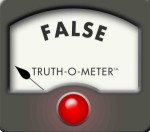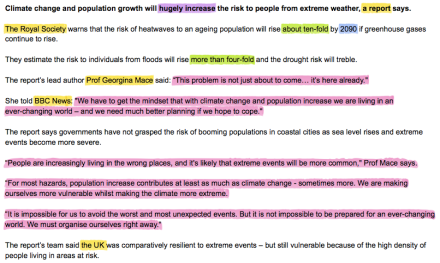Shocking number isn’t it? But is it true? No, it isn’t of course. You can take that from me, because I totally made it up. But normally a journalist has to check this kind of information. They call it fact checking. Only a few newspapers employ fact checkers. One of them is the German newspaper Der Spiegel. Since 2010, it goes around that they have 70 fact checkers in service. In contrast, the New York Times only have 16 fact checkers. These numbers are based on an article of Craig Silverman. In the meanwhile, there are several organizations that started, for example, with checking the facts that are said by the politicians of their country (politifact.com and AZ Fact Check). According to Craig Silverman, there is a whole process that lies behind the question ‘Is the fact true?’. In this blog post I will present you this process (of course with an example) and I am going to ask the question whether the fact checking process is still the responsibility of a journalist or not.
The process of fact checking
Reynolds Center for Business Journalism created an accurate checklist for journalists. The first section of this checklist (see picture) consists of four questions to check the facts you used in your article.
The picture below shows a section of the article ‘Risk from extreme weather set to rise’ published by the BBC. In this picture I carried out the first step of step four of the checklist. I highlighted names and titles yellow, numbers and calculations green, dates and ages blue, quotes pink and superlatives purple. According to the Reynolds Center for Business Journalism should all these facts been double-checked before the BBC should publish the article.
In this section of the article they already used every kind of fact that are mentioned by Reynolds Center for Business Journalism. When I look at the picture I personally miss one kind of fact. In the article they constantly refer to ‘the report’. This raises a few questions in my mind: ‘What report?’, ‘What’s the title of the report?’ and ‘Who carried it out?’. Therefore, in my opinion, there needs to be added one criterion at the checklist: Is every source concretized enough?
Back to the process of fact checking, supposing that the rest of the article also consists of many facts, you can imagine that the number of facts in an article can be very high. Consequently, the duration of the fact checking process will be long. Journalists of an organization without a fact checking department have to check the facts by themselves. You can understand that it is almost impossible to write an article, check all the facts and check in the meanwhile the other five paragraphs on the list of Reynolds Center for Business Journalism. In this point of view I can agree that it couldn’t be any longer the responsibility of the journalists to check all the facts. They can’t simply bear the responsibility, because they have not enough time to do it. But does this mean that the people have to learn fact checking by themselves? I don’t think so. I do think that it is a good thing that the people know that not all what is in the newspapers is true, but you can’t demand of the people that they are going to check the facts by themselves. The people simply want to read the news and stay updated.
Due to the fact of the upcoming fact checking organizations, there is certainly a need for fact checking. But if we don’t change anything of the fact checking process, the people have to read the newspapers and must stay updated by the fact checking organizations. Maybe we have to take a better look at the fact checking process of the German newspaper Der Spiegel. They organized their fact checking department by areas of expertise (i.e.: politics, science, economics, foreign affairs, culture, sport and medical). Besides this, the factcheckers do not only check the facts, they are also involved in the writing process. This results, in my opinion, in a more efficient method than the method of the New York Times, where the fact checkers see the article for the first time when it is finished or close to finished. So that means that they aren’t involved in the writing process.
In conclusion, I think that it is still the responsibility of the news organizations to check the facts. Besides this, I think that it is better that they employ fact checkers than let the journalists check the facts by themselves. This may cost a lot of money, but at the end I think that it makes your news organization more reliable.




I really like your addition of the extra step. I also believe that this is necessary. I think that it is better for news organizations to hire fact checkers and not let journalists do the fact checking, but I also realize this is really time consuming and I think, although I do not agree, that news organizations don’t have the time anymore. They want to stay on top of the news and be the first one to report the news. Fact checking does not fit in this picture.
LikeLike
I agree with you that fact checking is still important. The way of providing news has dramatically changed with the upcoming of the internet. I do understand that providing news now has to be done in a much higher pace, but checking your facts did not become less important. I agree with you that facts better can be checked by an independent fact checker. In this way there still is a fresh perspective on the facts which are provided in an article.
LikeLike
The way you show how fact checking works in a real life setting is interesting. It is sometimes an abstract term which is hard to implement correctly for news organisations. What Der Spiegel does is very impressive, but also a very unique situation. Most organisations are not able to do fact checking the way they do it, so we cannot all compare them with Der Spiegel. By the way you said Der Spiegel is a newspaper, but it is a weekly magazine:).
LikeLike
Your addition to the list is a good one, I didn’t notice it until now. You are right, people read the news to get informed and to read true information. If journalists don’t have the time for this, it needs to be done by other people. Hiring fact checkers is a good option, which indeed (as Els already wrote) gives people with a fresh perspective the opportunity to look at the article. Whoever does it, for me fact checking still remains an important aspect of creating news articles.
LikeLike
Nice intro!
I agree with the criteria you add, responsibility or not of journalism, readers always have to raise some questions. I believe that fact checking can be applied correctly to some articles but not all. Sometimes stories are not about facts but about opinions and how you do fact-check then?
However, like you conclude, at the end of the day there has to be a process of checking for those who want to mislead or make mistakes that are easily traceable.
LikeLike